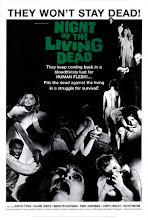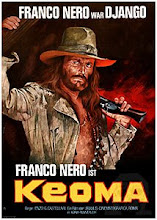 Detour
DetourDirector Edgar G. Ulmer Writer Martin Goldsmith
Cast Tom Neal (Al Roberts), Ann Savage (Vera), Claudia Drake (Sue Harvey), Edmund MacDonald (Charles Haskell Jr)
Some films were destined to be the bottom of a double bill. They’re called B films, the companion feature to the A-film, usually clocking it at just over an hour so that it’s a pleasant time waster before the main attraction.
As fate would have it, some B-films take on a life of their own - somewhere amongst the threadbare budget and skidrow cast there lies an inadvertant masterpiece. It’s not always apparant at the time, and tends to get lost in the endless shuffle to get product onto screens. Even decades later, like Nazi gold they remain waiting to be discovered.
 Detour is one such film. A taut, complex thriller made in 1945 by B specialist Edgar G. Ulmer, the film has rightly joined the ranks of other film noir classics. Tom Neal plays musician on the verge of a breakdown Al Roberts, the quintessential genre everyman who, after his girlfriend leaves him for a better gig on the West Coast, packs in his grief-hole and starts to hitch hike to
Detour is one such film. A taut, complex thriller made in 1945 by B specialist Edgar G. Ulmer, the film has rightly joined the ranks of other film noir classics. Tom Neal plays musician on the verge of a breakdown Al Roberts, the quintessential genre everyman who, after his girlfriend leaves him for a better gig on the West Coast, packs in his grief-hole and starts to hitch hike to
 Tom Neal and Ann Savage make one of the screen’s most reprehensible couples; with Al as the pitiful submissive loser and Vera the castrating succubus, their overwrought dialogue almost crawls off the screen in disgust. But it’s this very “how low can you go” quality that nails you to the screen. Detour may have taken Ulmer just six days to film, but it will take you a lot longer to get the sheer loathing and degradation from your memory. For a Poverty Row production, it’s astounding it’s so good. Like the old tagline from Miracle Pictures: “If it’s a good picture, it’s a Miracle.”
Tom Neal and Ann Savage make one of the screen’s most reprehensible couples; with Al as the pitiful submissive loser and Vera the castrating succubus, their overwrought dialogue almost crawls off the screen in disgust. But it’s this very “how low can you go” quality that nails you to the screen. Detour may have taken Ulmer just six days to film, but it will take you a lot longer to get the sheer loathing and degradation from your memory. For a Poverty Row production, it’s astounding it’s so good. Like the old tagline from Miracle Pictures: “If it’s a good picture, it’s a Miracle.”
Tom Neal was a tragic figure in real life who after a series of public brawls and very public failed marriages, was charged in 1965 for emptying the contents of his gun into his sleeping wife. The charge was manslaughter and he served six years, but barely made it 2 years out of prison before passing away of a heart attack. He was clearly a man brimming with inner demons, and this conflict is so perfectly expressed in Neal’s on-screen disintegration.
 “He went searching for love... but Fate forced a DETOUR to Revelry... Violence... Mystery!” It’s time to stop hitching, ‘cause your lift has arrived. It’s Tom Neal, Ann Savage and director Edgar G. Ulmer behind the steering wheel for the 1945 B noir masterpiece Detour.
“He went searching for love... but Fate forced a DETOUR to Revelry... Violence... Mystery!” It’s time to stop hitching, ‘cause your lift has arrived. It’s Tom Neal, Ann Savage and director Edgar G. Ulmer behind the steering wheel for the 1945 B noir masterpiece Detour.
The Godfather Squad
Hong Kong/Italy 1974 colour
aka Little Godfather, Little Godfather Of Hong Kong, Little Godfather From Hong Kong, Godfather Of Hong Kong, Hong Kong Godfather, Kung Fu Executioners
Director Ng See-Yuen
Cast “Bruce Liang”/Siu Lung (Wang Liu), Gordon Mitchell (Duke Carro), Shirley Corrigan (Lilly), Maria D’Incoronato (Ivy), “Yasuaki”/Shoji Kurata (Kurata), Consalvo Dell’Arti, Mung Hei, Mario Cutini, Fan Yue
One of many Hong Kong/European co-productions from the glorious two year period after Enter The Dragon and the untimely death of its star Bruce Lee made kung fu films the soup du jour. Ng See-Yuen, a former executive for Shaw Brothers, branched off as an independent producer and director, and helped propel the career of many an action star including Jackie Chan. His first protoge however was a Bruce Lee-alike called Bruce Liang or Bruce Leong, a competent performer and exceptional martial artist who would grace the screens in such Bruceploitation classics as The Clones Of Bruce Lee and The Dragon Lives Again.
 One of Liang’s first starring roles was 1974’s The Godfather Squad aka Little Godfather From Hong Kong, a predictably opportunist move by Ng See-Yuen to capitalize on both the kung fu AND mafia craze following the success of Francis Ford Coppola’s The Godfather. And where else would you film a Godfather ripoff but in
One of Liang’s first starring roles was 1974’s The Godfather Squad aka Little Godfather From Hong Kong, a predictably opportunist move by Ng See-Yuen to capitalize on both the kung fu AND mafia craze following the success of Francis Ford Coppola’s The Godfather. And where else would you film a Godfather ripoff but in

 Technically The Godfather Squad is as rough and choppy as a thousand kung fu capers from the 70s, but worth the price of admission alone to see former muscleman and one-time Hercules Gordon Mitchell as Carro’s adopted son Duke, the son of an SS officer whose cruel face, wide eyes, ludicrous German accent and Gestapo hat tries to out-Kinski Klaus baby in the uber-psycho stakes. About Duke, Carro recalls fondly, “One day he killed two Negroes. He came home as if nothing had happened, and I knew he was the type of son I’d be proud of."
Technically The Godfather Squad is as rough and choppy as a thousand kung fu capers from the 70s, but worth the price of admission alone to see former muscleman and one-time Hercules Gordon Mitchell as Carro’s adopted son Duke, the son of an SS officer whose cruel face, wide eyes, ludicrous German accent and Gestapo hat tries to out-Kinski Klaus baby in the uber-psycho stakes. About Duke, Carro recalls fondly, “One day he killed two Negroes. He came home as if nothing had happened, and I knew he was the type of son I’d be proud of."
 But it’s not bad as most B-Grade kung fu nonsense. The schizophrenic soundtrack’s an enjoyably mixed bag of crazed surf music, prog-rock, snatches of spaghetti western operas and even the opening strains of the Theme From Shaft! The 2000 year-old Ancient Rome backdrop adds to the film’s cosmopolitan feel, and even the Pope makes an appearance in front of a crowded St Peter’s Square while Carro’s youngest would-be assassin is brandishing a pistol - imagine getting away with a stunt like THAT today. And watch for the most outrageous continuity flaw in the film’s end fight scene: Liang and Carro’s other adopted son Kurata (Yasuaki Kurata) fight their way from the middle of
But it’s not bad as most B-Grade kung fu nonsense. The schizophrenic soundtrack’s an enjoyably mixed bag of crazed surf music, prog-rock, snatches of spaghetti western operas and even the opening strains of the Theme From Shaft! The 2000 year-old Ancient Rome backdrop adds to the film’s cosmopolitan feel, and even the Pope makes an appearance in front of a crowded St Peter’s Square while Carro’s youngest would-be assassin is brandishing a pistol - imagine getting away with a stunt like THAT today. And watch for the most outrageous continuity flaw in the film’s end fight scene: Liang and Carro’s other adopted son Kurata (Yasuaki Kurata) fight their way from the middle of
It’s more Crapola than Coppola, and certainly not a classic, but an interesting East-meets-West hybrid in the Bruceploitation canon nevertheless.
























































































No comments:
Post a Comment